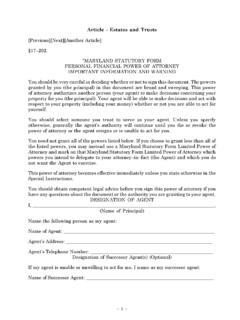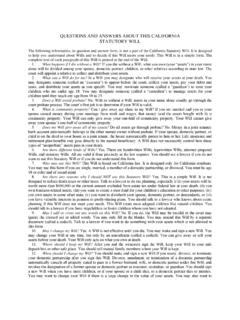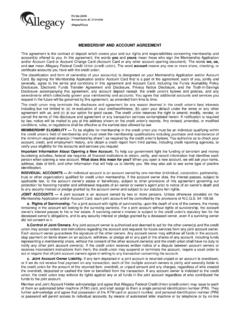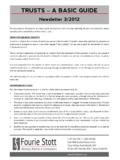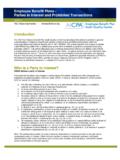Transcription of THE TRUST FOR SALE - Kessler
1 Extract from 2nd Edition of Drafting Trusts and Will Trusts James Kessler (1995)THE TRUST FOR SALE6-041 The TRUST for sale represents the nadir of English land law. In theory a TRUST for sale is a direction to trustees to sell TRUST property, the trustees having a power to postpone the sale. The sale is then postponed indefinitely, so that-despite the TRUST for sale-no sale takes place. In reality the TRUST for sale is simply TRUST for sale is an essential provision. Land held on trusts which are not Trusts for Sale is generally settled land.
2 The provisions of the Settled Land Act 1925 apply. These are highly complex; settled-land-act settlements are rarely created today except by accident. The TRUST for sale is the means of escape from the Settled Land Act. It would be more logical if a draftsman could direct that the provisions of the Settled Land Act shall not apply ; but that would be void.(1) The TRUST for sale is a cipher which has the desired effect; that is its sole purpose and its principal effect. (2)The Settled Land Act, as the name suggests, is principally concerned with land.
3 There is no immediate need for a TRUST for Sale provision in a settlement whose TRUST property does not consist of land. Of course, trustees of any settlement may wish to purchase land, and section 32 of the Law of Property Act 1925 normally keeps the Settled Land Act at bay. The section provides: where a settlement of personal property .. contains a power to invest money in the purchase of land, such land shall, unless the settlement otherwise provides, be held by the trustees on TRUST for However, section 32 is not a complete solution. The section may fail to apply.
4 For instance, a purchase of a dwelling house by trustees may not be an investment, or the terms of a settlement may be held to disclose an intention not consistent with a TRUST for sale.(3)It is undesirable or at least inconvenient to maintain separate precedents for settlements for land and for personalty. The better course is therefore to include an express TRUST for sale clause in every settlement; and not to rely on section 32 to do the the TRUST for Sale6-042 There are a number of statutory precedents. On an intestacy, personal representatives hold the deceased s estate:(a) as to the real estate upon TRUST to sell the same; and1as to the personal estate upon TRUST to call in sell and convert into money such part thereof as may not consist of money, with power to postpone such sale and conversion for such a period as the personal representatives, without being liable to account, may think proper.
5 (4) The Statutory Will Forms provide another form: (1) The property shall be held- 1as the real property, if any, including chattels real, upon TRUST to sell the same, and2as to the personal property, if any, upon TRUST to call in, sell and convert into money such part thereof as may not consist of trustees shall have power to postpone such sale and conversion for such a period as they, without being liable to account, may think proper ..2 The trustees may invest in their names or under their control, the residue of the said money, or so much thereof as may not have been distributed, in any authorised investments, with power, at their discretion, to vary such investments for others of a like nature.
6 (5) >The essence of a TRUST for Sale clause is a direction that the trustees shall hold property on TRUST to sell the same. The common form of the clause is stylised and elaborate, and matters are exacerbated by adding to the TRUST for sale itself (i) a direction to invest the proceeds of sale; and (ii) a power to vary investments. In the Statutory Will Forms these extraneous matters are sensibly divided into distinct sub-clauses. In drafting the TRUST for Sale clause it is necessary to abandon the usual aim, to find a form which a layman will understand: the best that can be done is to keep the form short and inconspicuous.
7 Provisions implied by law can be omitted. Provisions which are not directly to do with the TRUST for sale are placed elsewhere. This results in a form of pleasing concision: Land Held on TRUST for Sale 6-043 The Trustees shall hold land in England and Wales on TRUST for sale. The common form TRUST for sale clause applies not only to land. Recognising that some forms of property may not normally be sold, ( a debt) the trustees are directed not just to sell the TRUST fund, but to sell, call in or convert into money. But a TRUST for sale is only required for land; it serves little purpose for other property.
8 (6) There may be cases where trustees are really intended to convert the TRUST property into money, in which case the wide form of TRUST for sale clause is entirely appropriate. It is unnecessary to provide that trustees should have power to postpone a sale of the land.(7) It is also unnecessary to provide that trustees should not be liable for postponing a sale, in the exercise of their discretion; or that a purchaser need not be concerned with the timing of the sale.(8) 6-044 The common form is concerned not only with a sale, but with the application of the proceeds of sale.
9 The trustees are directed to reinvest and given power to vary investments. Since trustees will have power to invest TRUST property, the direction here to reinvest is unnecessary. The power to vary investments is a separate matter from the TRUST for sale, though logically connected to it; if it is needed at all, it is better placed with the other administrative provisions. Sometimes the TRUST for sale clause makes specific provisio for deduction of the expenses which must be paid out of the rent of the land or out of the proceeds of its sale.
10 Thus trustees are required to hold property on TRUST for sale, and the trustees are to hold: the net proceeds of sale, after payment of costs, and the net rents and profits until sale after payment of rates, taxes, costs of insurance, repairs and other outgoings on the appropriate trusts.(9) This expanded wording recognises that in reality the trustees will pay the costs of sale from the proceeds of sale; and rates, etc. from the rents before sale. But so long as the trustees are given power to do this elsewhere there is no necessity to spell the matter out in the TRUST for sale clause.




